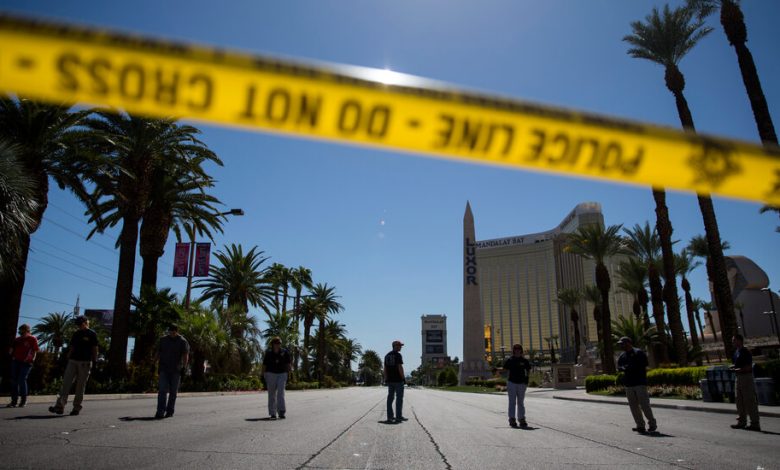Gunman in 2017 Las Vegas Shooting Was Angry at Casinos, New F.B.I. Files Show

The man who fatally shot 60 people at an outdoor music festival in Las Vegas in 2017 had been angry over what he saw as casinos scaling back on perks for V.I.P. gamblers like himself, according to an account provided to the F.B.I.
The newly released F.B.I. records fall short of answering the lingering question of why the gunman, Stephen Paddock, opened fire on a country music concert crowd on the Las Vegas Strip from his perch on the 32nd floor of the Mandalay Bay Resort and Casino. By the time the authorities arrived at his suite, Mr. Paddock, 64, had killed himself, leaving no suicide note or any other indication of a motive.
The attack on Oct. 1, 2017, killed 60 people and injured hundreds more in the deadliest mass shooting in modern U.S. history.
Investigators have long scoured the case for explanations, but a few years ago Las Vegas police concluded their investigation by saying that he had no clear motive.
Investigators and behavioral analysts at the F.B.I. similarly concluded in 2019 that they could not determine a “single or clear motivating factor” behind the attack. Investigators said it appeared that Mr. Paddock had wanted to die by suicide, after experiencing a decline in physical and mental health.
Gun Violence in America
- The Emotional Toll: We asked Times readers how the threat of gun violence has affected their mental state and the way they lead their lives. Here’s what they told us.
- A Growing Tally: Gun violence is a persistent American problem. A partial list of mass shootings this year offers a glimpse at the scope.
- Gun Control: U.S. gun laws are at the center of heated exchanges between those in favor and against tougher regulations. Here is what to know about that debate.
The newly released reports of F.B.I. interviews with people who knew or interacted with Mr. Paddock, made public in recent days, shed some new light on what has long been known about his obsessive, high-roller gambling habits and his state of mind before he unleashed a barrage of gunfire from his hotel window.
Mr. Paddock, who sometimes spent up to 18 hours a day gambling in various hotels, “was very upset at the way casinos were treating him and other high rollers,” one gambler told the F.B.I.
“The stress could easily be what caused Paddock to ‘snap,’” he said.
The fellow gambler said that Mr. Paddock and gamblers like him would frequently carry around $100,000 in cash and “had a bankroll of approximately $2 to $3 million.” He described Mr. Paddock as personable and intelligent and said that like “all professional gamblers,” Mr. Paddock “frequently kept to himself.”
He explained that casinos had long treated high-rollers with free cruises, penthouse suites and tours but that those perks had been scaled back in recent years.
A woman who worked at the Tropicana Las Vegas told the F.B.I. that Mr. Paddock visited there about once every three months and was a “prolific” video poker player. The woman said that he did not talk about anything personal with her, but he appeared to like rock ’n’ roll and had attended some concerts at the Tropicana.
According to the documents, he stayed at the Tropicana beginning a couple weeks before the shootings and lost $38,000 during that visit.
The documents revealed that a different interviewee told the F.B.I. that over dinner at Applebee’s, Mr. Paddock shared with him that gambling had been his main source of income and that he had bought a handgun for protection because he was earning a lot of money.
Mr. Paddock’s planning for the attack appeared to have been methodical, law enforcement investigations have shown. He had been stockpiling weapons for about a year, all purchased legally, and researching event venues, with internet searches such as “biggest open air concert venues in USA.” He had a hotel reservation in August, two months before the attack, in a room that overlooked the Lollapalooza music festival in Chicago. After settling on Las Vegas as his target, he spent days carrying an arsenal of guns into the hotel across the street from the Route 91 Harvest music festival.
Mr. Paddock had grown wealthy over the years from buying and selling apartment complexes around the country, the agents wrote, information that was also previously known. He and his family sold a complex in Texas in 2012, the F.B.I. said in one document, and Mr. Paddock used the proceeds to “buy dozens of weapons that were ultimately used in the shooting.”
The F.B.I. reported scrutinizing a series of letters involving Mr. Paddock that were said to have been found in a vacant office building in Texas. The details of the letters were not disclosed, and while F.B.I. agents worked to authenticate them, the new documents do not detail their conclusions.
One person who reported being a business acquaintance of Mr. Paddock told agents that in 2016, about a year before the shooting, Mr. Paddock was stockpiling money and was “mad at the system.” While large portions of this and other sections of the interview notes were redacted, the former acquaintance reported that Mr. Paddock had been fascinated by the Oklahoma City bombing that killed 168 people in 1995 and “thought ADOLF HITLER was a good man.”
The man, who spoke to agents in the days after the attacks, described apparent “threats” of some kind from Mr. Paddock — the nature of which is not detailed in the documents — but he did not take them seriously until May 2017, a few months before the Las Vegas shooting. It was unclear from the records what the man did after that or how agents handled the information.
Investigators have said that Mr. Paddock had no connections to terrorist or hate groups, and no criminal record. They found that while his wealth had diminished before the attacks, he was not in debt.
